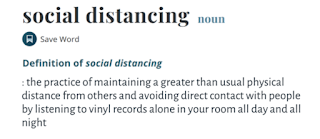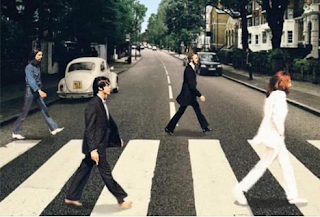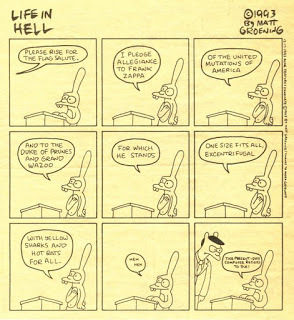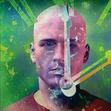Marty Halpern's Blog, page 4
March 21, 2020
March 18, 2020
Social Distancing....
Published on March 18, 2020 12:31
March 15, 2020
If The Beatles Were Recording "Abbey Road" Today....
Published on March 15, 2020 17:20
February 17, 2020
"Hallelujah" Performed by K. D. Lang at Fire Fight Australia
"Hallelujah," written by Leonard Cohen, performed by K. D. Lang, at the Concert for National Brushfire Relief, Sunday, February 16, 2020, at ANZ Stadium, Sydney, Australia.
To donate: Fire Fight Australia.

Published on February 17, 2020 14:14
December 11, 2019
Frank Zappa (December 21, 1940 – December 4, 1993)
Published on December 11, 2019 16:54
September 28, 2019
Patti Smith and Choir! Choir! Choir! - People Have The Power
"People have the power...to wrestle the world from fools...."
This is my second posting of a Choir! Choir! Choir! video. The first featured David Byrne and the song "Heroes" (written by David Bowie and Brian Eno). You can view that video here.

This is my second posting of a Choir! Choir! Choir! video. The first featured David Byrne and the song "Heroes" (written by David Bowie and Brian Eno). You can view that video here.

Published on September 28, 2019 13:36
September 21, 2019
In Celebration of the 50th Anniversary of "The Weight" - Song Around the World / Playing for Change
"The Weight" was written by Robbie Robertson, recorded by his group The Band, and released on the album Music From Big Pink in 1968.
From Rollingstone.com (September 18, 2019):
"What key is it in, Robbie?" Ringo Starr, sitting behind a drum set, asks Robbie Robertson over the phone. Ringo nods. "F-demented!" What happens next is a joyous cover of "The Weight," with Robertson reprising the recording's soulful intro lick. A series of musicians from all over the world – Marcus King, Lukas Nelson, the Japanese guitar virtuoso Char, Congo soul singer Mermens Mosengo and more – all add their own flavor to the classic from different locations.
The project comes from Playing For Change, a group dedicated to "breaking down the boundaries and overcome distances between people." That includes 15 music schools across 11 countries, documentaries and viral videos bringing artists from different cultures together; the group has released videos for "Redemption Song" [Bob Marley], "What’s Going On" [Marvin Gaye], and more ["All Along The Watchtower by Bob Dylan]. "The Weight" was done on an epic scale, a year and a half of production over five continents. "We made it brick by brick, starting with Robbie," says co-founder Mark Johnson, a Grammy-winning producer-engineer who's worked with Paul Simon, Keith Richards, and more. "That's what makes this special. We could never have never assembled this group in the studio. You need to go there, and then when you go there, you're where they feel comfortable....
We had built a mobile recording studio... Now I have little battery packs so we traveled the world with a mobile studio, great equipment and some cameras and this one we started off with Robbie Robertson playing guitar... And then as we traveled the world, we would deconstruct [the track.] So Ringo would replace the drums. Hutch [James "Hutch" Hutchinson”] would replace the bass. Everywhere I go, I'm putting headphones on musicians, and they're listening to whatever preceded them and playing along. And that's how we built it as we went from country to country. I think in this video, we went to about ten different countries.
Learn more about Song Around the World on the Playing For Change website -- and check out all those other videos!

Published on September 21, 2019 12:45
August 23, 2019
Jeff Buckley - Grace
In memory of Jeff Buckley (November 17, 1966–May 29, 1997) on the twenty-fifth anniversary of the release of his Columbia Records album
Grace
[image error] on August 23, 1994.
"Hallelujah" (Official Video)
"Lover, You Should've Come Over"
Recorded live at the Middle East Club in Cambridge, Massachusetts, February 19, 1994
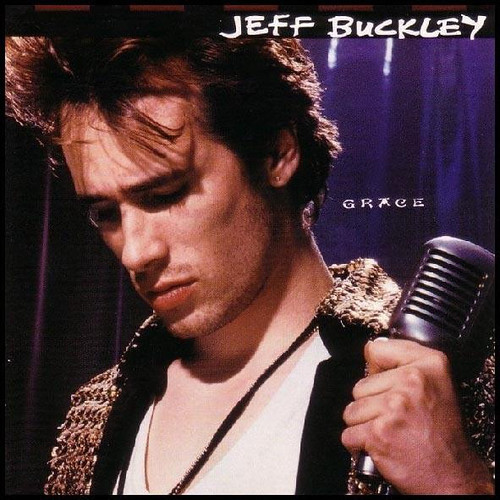

"Hallelujah" (Official Video)
"Lover, You Should've Come Over"
Recorded live at the Middle East Club in Cambridge, Massachusetts, February 19, 1994


Published on August 23, 2019 16:20
August 20, 2019
Now Reading: The Vinyl Detective: Written in Dead Wax by Andrew Cartmel
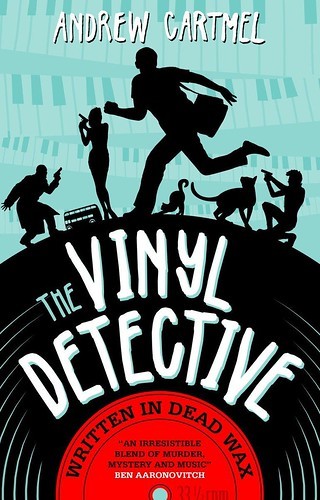 This is the first mystery I've read in a very long time, and especially one that kept me reading, page after page, wanting to learn what happens next.
This is the first mystery I've read in a very long time, and especially one that kept me reading, page after page, wanting to learn what happens next.The Vinyl Detective: Written in Dead Wax [image error] by Andrew Cartmel (Titan Books, 2016) is the first volume in an ongoing series that currently numbers four -- and I already have book number 2 on order.
Recently, I seem to be selecting books to read that have received a starred review in Kirkus. Those familiar with Kirkus know that even being reviewed by this publication is indeed rare; receiving a starred review nearly requires cosmic intervention.
For those not of the vinyl record persuasion, the "dead wax" of the title refers to the area on a record between the end of the last track and the label. Typically "matrix" information is provided in this runout area, sometimes stamped, sometimes etched, occasionally both: alphanumeric information that pertains to that pressing of the record. Often the only way to tell a first pressing of an album from a reissue is by the matrix runout information.
I was relating some of the story to my wife and I couldn't remember the protagonist's name -- the Vinyl Detective of the title -- so I picked up the book and leafed through what I had read at that point, and realized that his name is never given! Even when he meets up with friends or talks to friends on the phone, no one addresses him by name. He picks up a nickname or two along the way, but we never learn his real name. That I found quite intriguing. I'll have to see if Cartmel's "no name" quirk continues into the next volume.
As to the story: years ago, our protagonist, a rather unassuming record-collecting geek, had handed out business cards at record stores, pubs, and dj gigs. The business card simply read "Vinyl Detective" below his name and address. So much time had passed that he actually forgot about those business cards. Now, years later, one of those cards results in a knock at his door -- and an offer to hire him to track down an extremely rare jazz album from the 1950s, of which only a few hundred were pressed at the time.
This album, as it turns out, is one of fourteen different titles that the record label produced during the course of only one year, before the owner of the label committed suicide and the label ceased production.
Of course, beatings, murders, and mayhem ensue -- this is a mystery, as I said. But, as the subtitle suggests, the secret to the mystery is written in the dead wax -- and to learn that secret, our Vinyl Detective must actually track down all fourteen of those albums.
"An irresistible blend of murder, mystery and music... our protagonist seeks to find the rarest of records – and incidentally solve a murder, right a great historical injustice and, if he's very lucky, avoid dying in the process." —Ben Aaronovitch, bestselling author of Rivers of London
"Crime fiction as it should be, played loud through a valve amp and Quad speakers. No digital writing here, it's warm and rich. Every delicate pop and crackle adding character and flavour. Witty, charming and filled with exciting solos. Quite simply: groovy." —Guy Adams, critically acclaimed author of The Clown Service
"The Vinyl Detective is one of the sharpest and most original characters I've seen for a long time." —David Quantick, Emmy Award-winning producer of VEEP
I haven't had this much fun reading a mystery novel in a long time.
You can find The Vinyl Detective at your book store of choice or via Amazon.com[image error].

Published on August 20, 2019 13:32
August 11, 2019
The Final Excerpt: Chapter 22: The Universal Tone by Carlos Santana
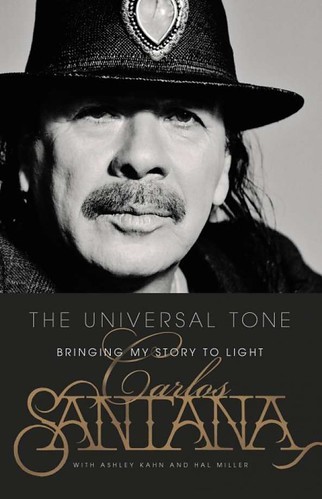 I have to hope I'm not dulling the senses with all these excerpts from Carlos Santana's autobiography,
The Universal Tone: Bringing My Story To Light
[image error].
I have to hope I'm not dulling the senses with all these excerpts from Carlos Santana's autobiography,
The Universal Tone: Bringing My Story To Light
[image error].Chapter 22 deals with the making of the album Supernatural. Unfortunately the pages are too numerous to excerpt, so if you've read -- and enjoyed -- the excerpts I've posted so far, then please do snag the book for yourself. You won't be disappointed....
At this point in Santana's career, he and the band were still under contract to Island Records, with two albums remaining on that contract. Carlos met with Chris Blackwell, of Island Records, for lunch and simply asked him to release him from his contract. Carlos felt something special was brewing, and Island Records was not the label to be with. Much to Carlos's surprise, Chris agreed, and with no strings attached. (Chris could have made Carlos pay for the remaining two albums, he could have asked that Carlos's next label buy out the contract, etc. but he didn't -- he simply let Carlos go.)
This allowed Carlos and Santana to team up again with Clive Davis, now with Arista Records. Clive was formerly the head of CBS (Columbia Records) in 1968, and he was instrumental in the production of the first Santana album. Clive put together the entire Supernatural [image error] album, bringing together all the singers and musicians who performed with Santana on that album. Clive Davis wanted to put Santana back on the radio!
Excerpt from Chapter 22:It's really hard to describe how it feels when something [Supernatural] hits that big, all around the world, and you're in the middle of it. It's like being that cork floating on a big ocean wave—how much am I controlling, and how much is controlling me? Every day the ego games have to be checked, and you have to find your balance again.In February of 2000, Clive told me that Supernatural had been nominated for ten Grammy Awards. Deborah started calling me a new name even before we got to the show. "So, Mr. Grammy, how many do you think you'll win?" The kids were like, "Yeah, Dad, how many?" I was feeling that I'd be lucky and happy with one. That's why, when I won the first one during the event that takes place in the afternoon, I thanked everyone I could— Clive, Deborah, my father and mother and the kids. When I won the next one, I was thanking my siblings and the musicians and songwriters. By the time of the evening event, which was on TV, I felt like one of those dogs playing fetch with a Frisbee, and it became something to laugh about: winners in other categories, such as classical music and country, started thanking me for not doing an album in their genres.The whole thing was a blur, really. The two things that I was most proud of were playing "Smooth" onstage, with Rob Thomas singing and Rodney Holmes [the drummer] bringing everything he had. I hit that first note, and everyone in the whole place jumped to their feet. My other favorite moment was when Lauryn Hill and my old friend Bob Dylan presented the Album of the Year award—that was the eighth and last Grammy that Supernatural won. They opened the envelope, and all Bob did was point to me—no words. I got up to accept it, and suddenly it was clear what I had to say."Music is the vehicle for the magic of healing, and the music of Supernatural was assigned and designed to bring unity and harmony." I thanked the two personal pillars who first came to mind: John Coltrane and John Lee Hooker.
The Universal Tone: Bringing My Story to Light is available from your bookstore of choice as well as Amazon.com[image error].

Published on August 11, 2019 17:18


